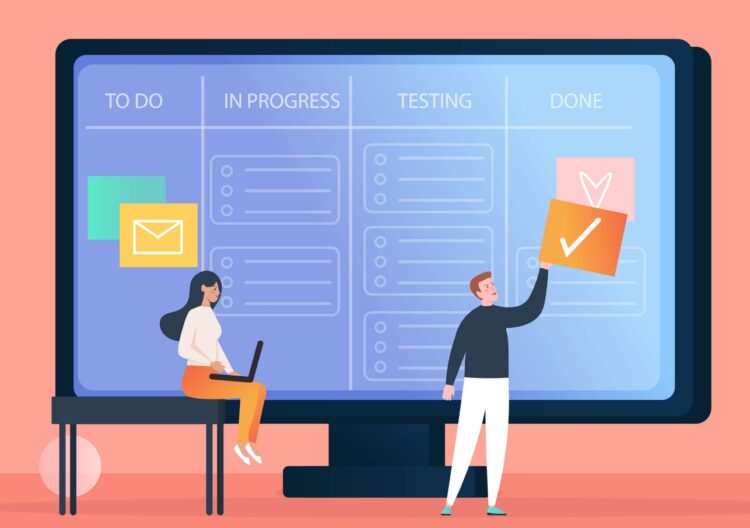
Although Project management tools are essential, many professionals don’t know the existence of types of this software.
Based on your requirement, you can choose the project management tools. For example, for a remote team, cloud-based project management software is an ideal solution.
This project management tools comparison shows that every type has a unique feature that caters to every business.
Here in this article, we have categorized project management tools based on three major types, which you should know before buying one.
1. Based on Operation

This category highlights how the software is installed. It is one of the major deciding factors to buy a project management tool.
-
Installation based project management software
Generally, you have to pay for a proprietary license for using the software. This is usually a one time fee. In some cases, the one time fee may be high enough to act as a barrier to getting a project management software. However, if you can afford the one time cost, an installed project management software can provide you with many advantages.
The most obvious advantage is that the cost of project management software, in this case, is not recurring. However, don’t let this make you think that you won’t have to spend any money on the software in the future.
For instance, it would be best to assign an IT specialist to troubleshoot technical bugs and safeguard important data obtained from the project management software.
This might translate into an additional cost for many businesses.
Also, the mobility of project management software is compromised. That means, it will be only available to use on certain physical computer systems that the concerned people may or may not have with them at all times.
-
Cloud-based project management software
Cloud based project management systems are a more agile alternative to installation based project management systems. Unlike their counterparts, cloud based project management systems usually come at a recurring subscription fee.
However, they have their own advantages. For instance, you can access all the features of your project management software from anywhere as long as you are connected to the web.
In fact, many cloud based project management systems are now offering mobile apps. That means, you can access the features of the project management software, along with the details of any project, on your smartphone.
Not to forget, another major advantage of cloud based project management systems is that you get a completely managed project. In other words, ensuring the project management software is working smoothly at all times is not your headache. Neither is the security of the data you are collecting and obtaining through the software.
2. Based on the area of expertise

The specialization category includes classification based on the plugins and modules present in the project management software.
You can look into the project management tools comparison to select the better one.
-
Portfolio
The project portfolio has a dashboard to display the bird’s eye view of your project. It is beneficial for complex project structures.
To complement working on multiple projects, portfolio project management software offer robust tracking, editing, and reporting features..
Portfolio project management software are best suited to manage large scale projects that take a long time to come to completion and have several moving parts. That’s why, these are most popularly used for construction, engineering, and real estate projects.
-
Tracking
This kind addresses the common glitches that hinder the project’s progress.
For example, if your project is corrupted continuously by bugs, the project management tool will automate bug tracking, thus speeding up the project. As you may have guessed, such project management software is used for digital projects like the development of complex websites and mobile or computer applications.
Time tracking, expense tracking, and budgeting features are more advanced in this category.
-
Scheduling
As the name suggests, this type helps to schedule your project deliverables using a timeline and Gantt Charts.
This project management tool is apt for activity-based projects such as live events, product launches, and concerts.
The schedule is established; accordingly, you can focus on project planning. Read more on project planning in this monday.com post.
3. Based on traits

This category defines how the user is intended to use the project management software. It depends on your project type.
-
Single user
Usually, a single user plan is preferred for performing personal projects. This type works best; only one user is involved in the project.
Single user type is typically useful for short term small budget project.
It must have a clear overview—for example, a DIY interior designing project.
-
Collaborative
It is the exact opposite of single-user types. Collaborative project management tools (such as monday.com) are designed for multiple users who can read, add, or edit all at once.
Interestingly, the changes are visible in all the systems once it’s updated.
Project management tools comparison shows that it helps complex projects involving teams with a project manager and stakeholders to monitor activities.
Also, this software works best on a cloud-based system.
-
Integrated
An integrative project management tool serves as the best option if you have various software to facilitate project functions.
The main benefit of this type is that you will get automated reports on all areas in one place.
For example, Customer Relationship Management (CRM) overlaps with various business processes.
So, including a CRM module integration with a project management tool helps record the feedback from customers on issues.
The Bottom line

To produce accurate on-time deliverables, you need a project management tool. As these solutions exist in various packages, understanding the types will provide you insights into choosing the right project management software.
With that said, remember that knowing exactly the kind of project management tool that is right for your needs is only the first step to selecting a project management software that can help you smoothen your delivery cycles. After this step, you will have to be very diligent while evaluating various options available in the market. Remember, choosing the wrong project management tool can do more harm than good and thus, the choice must be made with absolute care.











